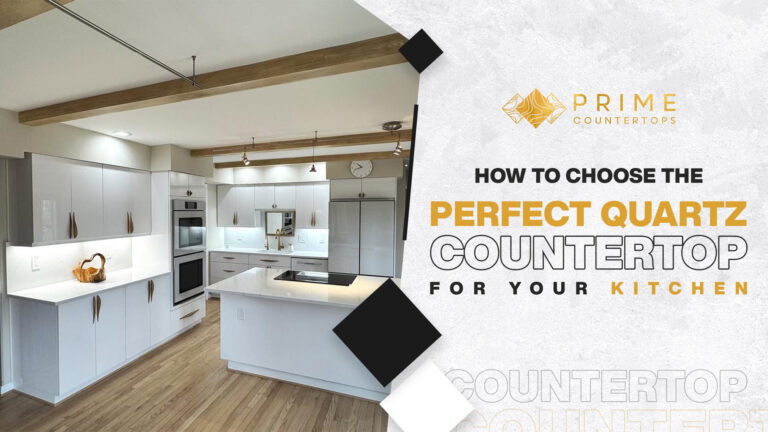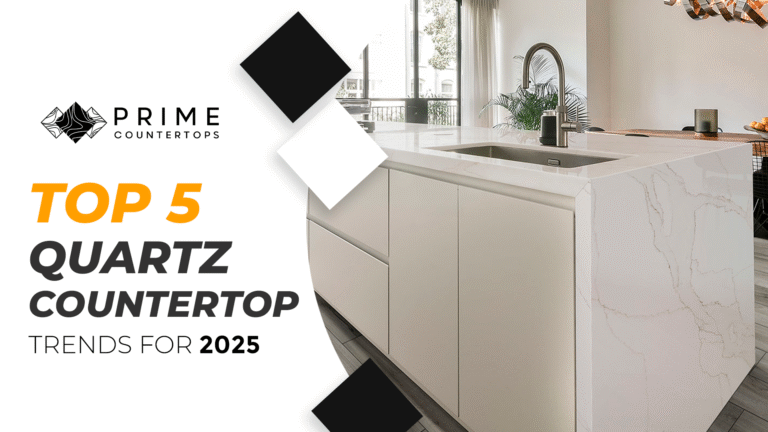When remodeling your kitchen, choosing the right countertop material is one of the most crucial decisions you’ll make.
Among the most popular materials for kitchen countertops are quartz countertops and granite countertops. Both materials offer excellent durability and aesthetic appeal, but each has its own set of advantages and disadvantages.
In this article, we’ll compare quartz countertops and granite countertops, focusing on their durability, ease of maintenance, resistance to stains and scratches, and long-term cost-effectiveness.
We’ll also provide some guidance on how to choose between these two materials based on your lifestyle, needs, and design preferences.
Overview of Content
What You Will Find Here:
Differences between quartz countertops and granite countertops in terms of durability and aesthetics.
Ease of maintenance: A comparison of quartz countertops vs granite countertops.
Durability and resistance to stains and scratches.
Which material offers the best long-term cost-benefit.
How to choose between quartz and granite according to your lifestyle and needs.
1. Quartz Countertops vs. Granite Countertops: Durability and Aesthetic Comparison
Durability
Both quartz countertops and granite countertops are renowned for their strength and durability. However, there are key differences that can influence your decision.
Quartz Countertops: Quartz countertops are engineered from a mixture of natural quartz crystals, resin, and pigments. This composition makes them incredibly strong, non-porous, and resistant to damage. They are highly durable, less prone to chipping, cracking, or scratching than granite countertops. Because of their non-porous nature, quartz countertops are also resistant to bacteria and mold growth, making them an ideal option for a hygienic kitchen.
Granite Countertops: Granite countertops are made from solid natural stone. While they are incredibly strong, they are more prone to chipping, especially at the edges. Although granite countertops are resistant to scratches, they can be damaged by extreme impacts, and their porous nature means they can absorb liquids, which may lead to staining.
Aesthetic Appeal
Both quartz countertops and granite countertops offer stunning looks, but the visual differences can influence your decision.
Quartz Countertops: Quartz countertops come in a wide variety of colors and patterns because they are engineered. This allows for more consistency in color and pattern, as well as greater customization. You can find quartz countertops that mimic the look of marble, granite, or other natural stones, offering versatility in design while still providing modern aesthetic appeal.
Granite Countertops: The natural stone appearance of granite countertops is hard to replicate, and each piece of granite is unique, with variations in color, veining, and pattern. If you prefer a natural look, granite countertops provide a luxurious, high-end feel that is prized for its authenticity and natural beauty.
2. Ease of Maintenance: Quartz Countertops vs. Granite Countertops
One of the most significant factors when choosing a countertop material is how easy it is to maintain. Let’s compare quartz countertops and granite countertops in terms of maintenance:
Quartz Countertops
Quartz countertops are incredibly low-maintenance. Since quartz countertops are non-porous, they do not require sealing, unlike granite countertops, which need to be sealed periodically to prevent staining.
To clean quartz countertops, you only need warm water and a mild dish soap. For more stubborn stains, you can use a gentle pH-balanced cleaner.
Because quartz countertops are non-porous, they are resistant to stains from liquids such as wine, coffee, and juice. This makes them easier to maintain, especially in busy kitchens where spills are common.
Granite Countertops
On the other hand, granite countertops are more high-maintenance. While granite is durable, it is porous, meaning it can absorb liquids like water, oil, or wine, which can lead to staining over time. Granite countertops must be sealed regularly (typically once a year or more often, depending on the usage) to prevent liquid absorption and staining. Without regular sealing, granite countertops can also harbor bacteria.
Cleaning granite countertops requires more care as well. Harsh chemicals should be avoided because they can degrade the stone’s sealant. Instead, it’s best to use a gentle cleaner specifically formulated for granite.
3. Durability and Resistance to Stains and Scratches
When it comes to durability, both quartz countertops and granite countertops are top choices for kitchens, but each material has its pros and cons:
Quartz Countertops
Quartz countertops are highly resistant to scratches, stains, and cracks. Since quartz is a manufactured product, it is designed to be more resilient than granite countertops. Quartz countertops do not require sealing because they are non-porous, meaning that spills and stains won’t seep into the surface.
However, while quartz countertops are highly durable, they are not entirely impervious to heat. Hot pots and pans should be placed on trivets or heat pads to avoid any potential damage.
Granite Countertops
Granite countertops, though incredibly durable, are not as resistant to scratches and stains as quartz countertops.
As natural stone, granite countertops are porous, which means that liquids can seep in and cause stains if not sealed properly. Additionally, granite countertops can chip and scratch, especially around the edges, if heavy items are dropped on them.
However, granite countertops are more heat-resistant than quartz countertops, making them a better choice if you tend to work with hot pots and pans directly on the countertop.
4. Long-Term Cost-Benefit: Quartz vs. Granite
When considering your kitchen remodel, cost is always a key factor. Here’s how quartz countertops and granite countertops compare in terms of cost and long-term value:
Quartz Countertops
While quartz countertops may have a higher initial cost compared to granite countertops, they are a more cost-effective choice in the long run. Since quartz countertops don’t need regular sealing, you save on both time and money for maintenance.
Additionally, their resistance to stains and scratches means you’ll spend less on repairs over the years.
The low maintenance required for quartz countertops can make them a more affordable option in the long term.
Granite Countertops
Granite countertops are often less expensive upfront than quartz countertops, but the cost of maintaining them over time can add up.
The need for periodic sealing, the risk of stains, and the possibility of chips and scratches requiring repair can lead to higher maintenance costs in the long run.
If you’re planning to stay in your home for a long time, granite countertops can still be a good option, but the ongoing maintenance should be considered in your budget.
5. How to Choose Between Quartz and Granite Based on Your Lifestyle and Needs
Choosing between quartz countertops and granite countertops ultimately depends on your personal preferences, lifestyle, and kitchen needs.
Choose Quartz if:
You want a low-maintenance option that doesn’t require regular sealing.
You need a non-porous surface that resists stains and bacteria.
You prefer a wide range of colors and patterns that can be customized to your kitchen’s design.
You want a countertop that’s more durable and resistant to scratches and chips.
You have a busy kitchen and prefer something that’s easy to clean.
Choose Granite if:
You love the natural stone look and appreciate the unique variations each slab offers.
You don’t mind performing routine maintenance, such as sealing your countertops annually.
You want a countertop that’s more heat-resistant for cooking with hot pots and pans.
You prefer a more authentic natural stone material with one-of-a-kind designs.
FAQ: Frequently Asked Questions About Quartz and Granite Countertops
1. Which is more durable, quartz or granite?
Both materials are highly durable, but quartz countertops are generally more resistant to scratches, stains, and chips due to their non-porous nature.
2. Do I need to seal quartz countertops?
No, quartz countertops do not need to be sealed because they are non-porous, unlike granite countertops, which require periodic sealing.
3. Which material is more cost-effective in the long term?
Quartz countertops are more cost-effective in the long term due to their low-maintenance nature, as they do not require sealing and are less prone to damage compared to granite countertops.
4. Are granite countertops better for heat resistance?
Yes, granite countertops are more heat-resistant than quartz countertops, making them a better option for those who frequently cook with hot pots and pans directly on the surface.
5. How do I maintain quartz and granite countertops?
To maintain quartz countertops, simply wipe them with mild soap and water. For granite countertops, clean them with a gentle cleaner and ensure they are sealed regularly to prevent stains.


